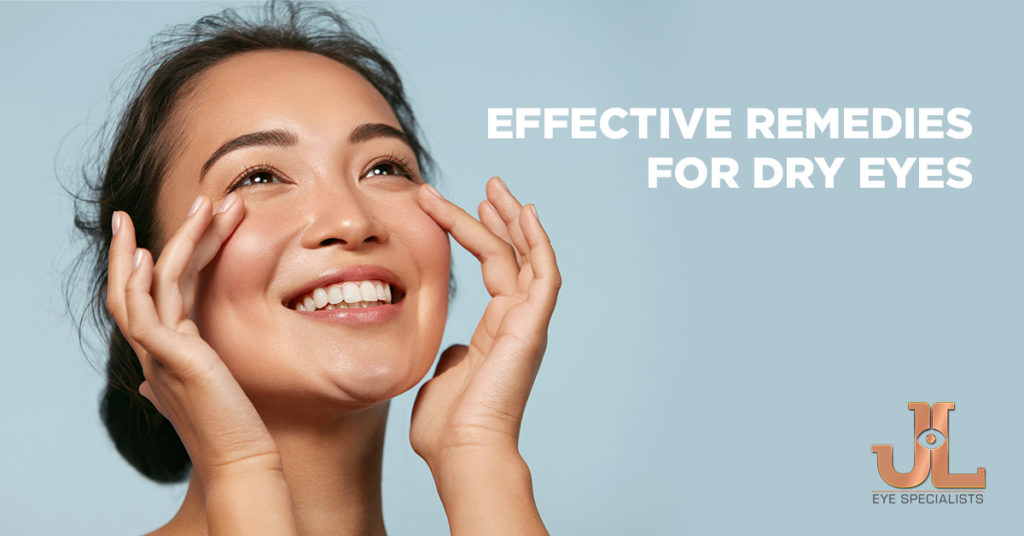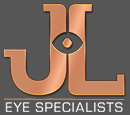Effective Remedies For Dry Eyes

After a marathon viewing of your favourite Netflix series, or an entire day glued to your laptop, you may feel your eyes become scratchy or gritty, as if some sand is stuck in them. Dry eyes occur when there are inadequate quality tears to lubricate and nourish the eye.
Dry eye syndrome (DES), also called keratoconjunctivitis sicca (KCS), is a multifactorial disease of the eye surface due to a loss of balance of the tear film. It can be a temporary or chronic condition and, if left untreated, can cause a variety of complications ranging from infections to double vision.
Fortunately, relief is available through remedies and treatments provided by your ophthalmologist. In this blog, we’ve summarised common dry eyes remedy options to help restore eye moisture.
Book a consultation with Dr Jimmy Lim today.
Detecting the Underlying Cause of Dry Eyes
The treatment of dry eye syndrome involves recognising the underlying cause of the condition and managing it to alleviate the symptoms. As with other eye conditions, a careful diagnosis is necessary for the doctor to know what treatment will work.
For instance, if you have a medical condition that causes the eyes to feel dry, the doctor needs to determine the condition and treat it accordingly. As a result of the treatment, your dry eyes will improve.
Meanwhile, some medical conditions that may cause dry eyes include allergic eye disease, rheumatoid arthritis, scleroderma, Sjogren’s syndrome, thyroid conditions, graft vs. host disease, sarcoidosis, lupus, and vitamin A deficiency, among others.
Treating these conditions first will eventually help resolve dry eye syndrome. However,, dry eyes caused by other factors, such as ageing, certain medications, tear gland damage, blepharitis or the inflammation of the eyelids, lid margin diseases, meibomian gland dysfunction, and inflammation of the eye surface, can be treated by dry eye remedy options like medications.
Dry Eyes Remedy Options
Treatments for dry eyes aim to restore the normal amount of tears in the eye to reduce dryness and maintain eye health. The primary approaches used to manage dry eyes include over-the-counter tear solutions, increasing tear production, treating underlying medical conditions, and treating inflammation of the eye surface or eyelids.
Here are the common remedies for dry eyes:
1. Dry Eyes Mmedication
For people who experience occasional or mild dry eye symptoms, using over-the-counter eye drops or artificial tears can help ease discomfort. For more persistent symptoms, consult your eye doctor for specific medications, depending on what’s causing your dry eyes.
Artificial tears
Eye drops can help increase eye moisture. Some people use artificial tears to lubricate the eye surface and reduce dryness, discomfort, and scratchiness. You can get artificial eye drops without a prescription.
Prescription medicines
For more serious dry eye conditions, your ophthalmologist may give a prescription for medicines. These include drugs to reduce eyelid inflammation, eye inserts for artificial tears, eye drops for corneal inflammation or irritation, autologous blood serum drops, and drugs that stimulate tear production.
- Antibacterials. In some instances, inflammation on the eyelid edges can impede the secretion of oil into the tears by the oil glands. The doctor may prescribe antibiotics in the form of oral pills, eye drops or ointment.
- Cyclosporine. The cornea surface may become irregular due to inflammation, irritation, and rubbing. The doctor will prescribe eye drops that contain cyclosporine or corticosteroids. Cyclosporine boosts the amount of tears in the eyes and reduces the inflammation over the cornea surface.
- Nicotinic acetylcholine receptor stimulation. Another novel treatment is through nicotinic acetylcholine receptor stimulation. The lacrimal unit controls tear secretion. In the afferent arm of the nerve innervation, the trigeminal nociceptors on the nasal mucosa and ocular surface. The nicotinic acetylcholine receptors on nerve endings in the nose trigger a reflex arc, causing instant tear secretion. It will help restore tear film homeostasis and promote natural tear film production.
- Eye inserts. For moderate to severe dry eye syndrome, another option is an eye insert, which is given if eye drops don’t help ease the symptoms. The eye insert looks like a clear grain of rice, called hydroxypropyl cellulose, which is placed between the lower eyelid and the eyeball. When the insert dissolves, it releases a substance to stabilise the precorneal tear film and prolong tear film breakup time (TFBUT). Also, it helps protect and lubricate the eyes.
- Autologous blood serum drops. The autologous serum is a blood-derived eye drop used to treat a multitude of eye surface diseases, including dry eye syndrome. It works by mimicking the biochemical properties of natural tears to heal the eye’s surface. These eye drops are effective and well-tolerated because they contain ingredients that artificial tears can’t replicate.
2. Surgery
In patients who don’t respond to medications or remedies, the eye doctor may recommend surgery. For instance, in patients with lid margin diseases such as blepharitis and Meibomian gland dysfunction (MGD), the condition may progress to a stye or chalazion, wherein an incision and curettage (I & C) are performed apart from topical antibiotics and anti-inflammatory medications. This is performed under local anaesthesia.
Closing the tear ducts to reduce tear loss is also an option your doctor may recommend. This can be performed by partially or completely closing the tear ducts through tiny removable silicone plugs or punctal plugs. In some instances, the doctor may perform thermal cautery to plug the tear ducts.
Learn More About: Dry Eyes – Causes, Symptoms & Treatment
3. Dry Eyes Remedy Options at Home
Adopting lifestyle changes or seeking simple home remedies for dry eyes is a good way to treat dry eyes.
- Apply a warm compress. Using a warm compress helps treat symptoms of various eye conditions. For instance, it can reduce inflammation and irritation due to dry eyes. In addition, applying heat provides a soothing and hydrating relief to dry eyes. It also helps stimulate the meibomian glands to improve oil gland function, stabilise the tear film, enhance oil flow into the eyes, and delay tear evaporation.
- Massage gently. Eyelid massages on the upper and lower eyelids by rolling your little finger in a circular motion will help push the oil out of the glands. Repeat the motion 5 to 10 times over 30 seconds with the eyes shut.
- Blink regularly. Blinking more regularly is a way to help relieve dry eyes. The American Optometry Association (AOA) recommends blinking regularly, especially after reading or using portable devices for extended periods, to renew the tear film, which is important for moisturising and protecting the eyes.
- Take essential fatty acid supplements. Nutritional supplements containing essential fatty acids may help reduce dry eye symptoms. Those containing high concentrations of omega-3 have been shown to improve symptoms of blepharitis and MGD. Further, these supplements help delay tear evaporation.
- Limit screen time and rest your eyes. Extended periods of portable device use and screen time could be contributing to your dry eyes. The light from the smartphone, television, and computer screen may cause eye irritation. A study has shown that computer users may blink less while using the device, which may contribute to dry eye syndrome. Remember to rest your eyes, take computer breaks, and blink regularly while using these devices.
- Drink more water. Hydration is always the key to maintaining the body’s health and it’s good for the eyes. Water lubricates your eyes, helping them produce more tears. Drink about 8 to 10 glasses of water every day.
- Get more sleep. Sleep is important for resting the mind and body. It’s the time the body recuperates — reducing stress, improving memory, and repairing cell damage. Sleep is also essential for dry eyes caused by an immune disorder as it regulates inflammation. A study on mice showed that not getting enough sleep reduced tear secretion and boosted defects in the epithelial cells of the cornea. However, the researchers also found that these changes could be reversed after two weeks of getting enough sleep.
- Change your environment. In some cases, high winds, air-conditioning, smoke, pollution, low humidity, and dust can cause temporary dryness and eye irritation. To reduce the dryness of the air, use a cool-mist humidifier, keep windows closed, and use air purifiers to block pollutants and dust.
Read: Why Are My Eyes Dry? Causes And Symptoms To Watch Out For
Say goodbye to dry eyes
With proper guidance and recommendations for your ophthalmologist, you can say goodbye to dry eyes. Remember, the dry eye remedy options at home may provide temporary relief. If the symptoms persist or worsen, it’s time to see your doctor.
Watch out for these symptoms that should prompt you to schedule an appointment:
- Severe pain
- Redness
- Swelling
- Discharge from the eyes
Schedule an eye exam with us today to learn more about how we can help with dry eye relief. Our medical director, Dr. Jimmy Lim at JL Eye Specialists, will help you personalise and form a dry eyes remedy plan for you.
Related Posts:
Relevant Services:
Relevant Services:
Our Doctor

DR. JIMMY LIM
Gleneagles Medical Centre
6 Napier Road #07-10,
Singapore 258499
Phone: +65 6258 8966
Fax: +65 6258 8766


